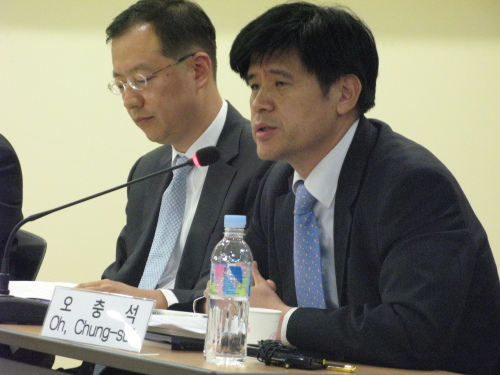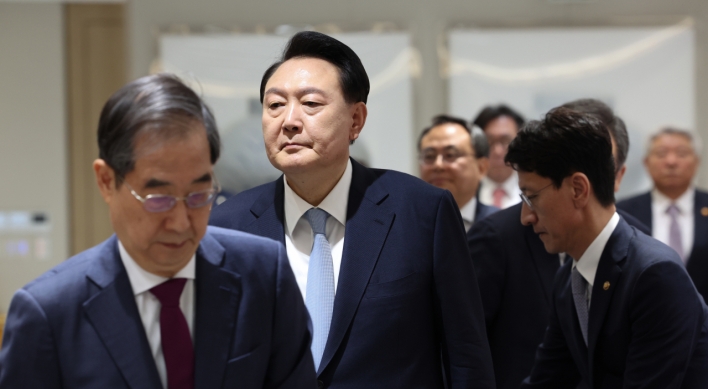The South Korean government has “not done much” to help citizens abducted in the North, ministry officials here have admitted, suggesting that Seoul may use food aid to push the issue with the communist state in future.
Senior officials for the unification and foreign affairs ministries at a conference this week cited “budget constraints” as a factor in the lack of support and compensation for families of those being held by the Pyongyang regime for decades.
More than 3,800 people have been abducted by the North since it signed a cease-fire agreement in 1953. Though many were repatriated to the South following inter-governmental talks, 517 of them are still detained in the country, many of them fishermen taken while working on the two countries’ maritime border.
Also among the abductees are 11 of those on a South Korean airliner hijacked by a North Korean agent in 1969. Thirty-nine of the passengers were eventually repatriated to the south but seven others and four crew members are yet to be returned.
The U.S. committee for Human Rights in North Korea said that the regime has kidnapped more than 180,000 people from 12 different countries. Some speakers at the conference organized by the Citizens’ Alliance for North Korean Human Rights accused South Korea of doing less for its abducted citizens than other nations, including Japan.
Ministry of Unification Separated Families Division section chief Oh Chung-suk said “admittedly the government has not done much” to ease the pain and suffering of families of abductees.
Senior officials for the unification and foreign affairs ministries at a conference this week cited “budget constraints” as a factor in the lack of support and compensation for families of those being held by the Pyongyang regime for decades.
More than 3,800 people have been abducted by the North since it signed a cease-fire agreement in 1953. Though many were repatriated to the South following inter-governmental talks, 517 of them are still detained in the country, many of them fishermen taken while working on the two countries’ maritime border.
Also among the abductees are 11 of those on a South Korean airliner hijacked by a North Korean agent in 1969. Thirty-nine of the passengers were eventually repatriated to the south but seven others and four crew members are yet to be returned.
The U.S. committee for Human Rights in North Korea said that the regime has kidnapped more than 180,000 people from 12 different countries. Some speakers at the conference organized by the Citizens’ Alliance for North Korean Human Rights accused South Korea of doing less for its abducted citizens than other nations, including Japan.
Ministry of Unification Separated Families Division section chief Oh Chung-suk said “admittedly the government has not done much” to ease the pain and suffering of families of abductees.

Speaking during a panel discussion during the conference in Seoul on Monday he said: “Over the years only small numbers of people have learned the whereabouts (of their abducted family members) and whether they are alive or dead has not been accounted for over many decades so I feel that we still have a long way to go,” Oh said.
Although Oh said the ministry had “belatedly” started giving support and compensation to families of abductees in 2007, these support mechanisms will be stopped when the related time-limited legislation goes out of action this October.
“So, unfortunately the compensation for the abductees has been in place only for a time-limited basis,” Oh added.
“In that sense the government has to put in more effort but the situation we find ourselves in is not that easy.”
Oh also said that the Lee Myung-bak administration had touched upon linking food aid with the abduction issue at Red Cross talks with the North in October last year.
“The government at that time came up with a certain amount per abductee family member,” he said, adding that the North’s shelling of Yeongpyeong Island that November had stalled such discussions.
“If there was a dialogue between the North and South I believe that the food aid issue and linking that with the abduction issue may start to emerge,” he said.
“There is a direction leaning towards bringing the food aid issue with the abduction issue.”
Section chief for human rights and social affairs at the Ministry of Foreign affairs and Trade Kwon Ki-hwan said Korea must continue to raise complaints over North Korea’s human rights abuses at an international level, and that more should be done to distinguish work to help abductees from political issues surrounding reunification.
“I admit that we have not really fulfilled our responsibilities to the full, therefore I feel on my shoulders the heavy burden of more responsibilities for the future,” he said.
But he added: “A lot of issues are mixed up and ongoing politically and in inter-Korean affairs. I cannot really give you a guarantee that we will be able to do this in future.”
But Hwang In-chul, whose father was among those taken in the Korean Air Flight YS-11 hijacking gave testimony at the conference saying: “How would you feel if the Japanese government recognizes the case of North Korea’s abduction of Japanese nationals as a violation of sovereignty, actively brings their citizens back, and continuously makes an effort to solve this problem while our own government maintains opinion as is?”
Kookmin University professor Park Jung-won called it an “ongoing issue that still needs great action.”
“We can learn from Japan’s actions and see that our government is not doing a very good job. Japan has been resolving the issues of abductions with legislation,” the advisor on South Korean legislation on repatriating abductees told the conference.
NKHR founder Rev. Benjamin Yoon, called for the government to deal robustly with abductions as crimes against humanity through domestic policy and international mechanisms.
“As long as these abductees are not returned, the family members of the abductees will continue to suffer from human rights violation crimes committed by North Korea,” he said.
By Kirsty Taylor (kirstyt@heraldcorp.com)









![[KH Explains] How should Korea adjust its trade defenses against Chinese EVs?](http://res.heraldm.com/phpwas/restmb_idxmake.php?idx=644&simg=/content/image/2024/04/15/20240415050562_0.jpg&u=20240415144419)








